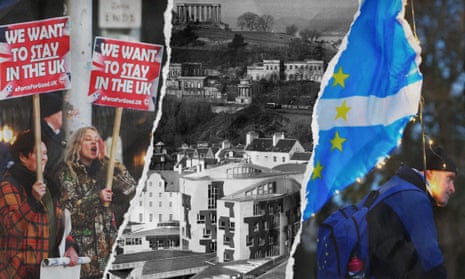Rory Scothorne: The IndyRef result took a decade to work its way through Scottish politics – now we may finally move on

In a way, nothing happened. It is easy to forget that despite all the upheaval that followed, 55% of Scottish voters decided to keep things as they were. Then, despite being on the losing side of the independence referendum, the SNP became unbeatable, the Conservatives staged a small but sturdy revival and Scottish Labour crumbled like loose shortbread in a handbag. Like those spooky bits of physics that threaten to overturn the whole discipline, the political consequences of the IndyRef seemed bafflingly disconnected from the actual result.
Look closer, however, and there was an obvious kind of gravity at work. The SNP’s landslide in the 2015 general election, in which it gained 50 seats and reduced Labour to just one in Scotland, came after a shock majority at Holyrood in 2011 that “broke” Scotland’s semi-proportional voting system.
But the SNP’s rise to power at Holyrood since 2007 was less of a movement towards independence – which rarely polled above 40% until 2014 – and more of a rejection of Scottish Labour.
The referendum campaign corralled Labour’s disenchanted voters into a new political vision with them at the centre: Scotland, said the SNP, was a sensible, centre-left country, defined by hard and dignified work, a community spirit, an open, internationalist heart and a burning hatred of the Tories.
It then lashed this to its nationalist project: independence would put these values back at the heart of politics. The idea was that the project wasn’t particularly radical. It was Britain that was radical, as the Tories wilfully trashed public services and allowed workplace exploitation and landlordism to rip across the country. We didn’t leave Britain – Britain left us.
The SNP’s cautious centrist approach provoked frustration from more excitable campaigners (myself included) who wanted a more radical break from Britain’s economy, politics and foreign policy. But there was a reason the SNP was in a position to exercise that power: it knew how to win elections.
It still wasn’t enough. While the arguments for independence kept time with Scotland’s centre-left heartbeat, the case against hitched a ride on the nation’s nervous system. The campaign may have been called Better Together, but the argument was anxious: we cannot afford all this dreaming.
I don’t envy the floating voter of 2014. I was, and remain, firmly pro-independence. But the subsequent 10 years have managed to vindicate absolutely everyone. The yes campaign told us that being part of the UK doomed us to either rapacious Tory governments or Tory-lite Labour governments.
Since then, the Conservatives have wrenched us out of the EU, bungled a deadly pandemic, pushed the economy off a cliff and driven public services into the ground. In its desperation to remove them from office, the Labour party has purged its own left wing, resigned itself to Brexit and accepted the masochistic “fiscal framework” that is strangling any serious public investment.
Yet all those changes have only emphasised how closely Scotland is entangled with the rest of the UK. Inside or out, we are shaped by it, a moon of 5.5 million people orbiting a planet of 61.5 million. Brexit has eviscerated the argument that independence would not meaningfully break ties with our biggest trading partner: “independence in Europe” would now seriously risk a hard border just above Berwick.
After 10 years of attempting to pursue a different agenda from England, the devolved system is in the doldrums. Scotland faces £500m of public spending cuts, which the Scottish Fiscal Commission attributes to homemade choices as much as Westminster austerity, and the political system is a farce, with the SNP mired in allegations of low-level financial misbehaviour involving campervans and unpaid debts. Scottish Labour, of all parties, now waits in the wings.
For a decade, Scottish voters reorganised their political behaviour around a referendum that had already been settled. Yessers surged into the SNP and the Greens, and no voters began to flow freely between Labour, the Tories and the Liberal Democrats based on whoever best captured the unionist zeitgeist.
In doing so, voters declared a sort of spectral independence – a fantasy-system of our own, clinging to the ghost of our last attempt at something more real. Perhaps that was preferable to the more difficult task of bringing Scotland’s split consciousness together – ambition and reality, optimism and pessimism, hope and fear. But now, 10 years later, we seem to be realising that nothing really did happen. Hopefully something else can begin.
-
Rory Scothorne is a historian and writer based in Edinburgh
Nicola McEwen: Polls show it would be foolhardy to see independence as an issue of the past

Ten years ago, Scots rejected independence by 55% to 45%. A clear enough victory for the no side, but close enough to leave the issue unresolved.
Today, 45% appears to be a floor rather than a ceiling on independence support. Asked how they would vote if there were a referendum tomorrow, most opinion polls suggest somewhere between 45% and 52% of voters in Scotland would choose independence. For an eight-month period during the first year of Covid, there were sustained yes majorities, and again in the month after the Liz Truss administration. Mismanagement of the UK government boosts independence.
The 2014 referendum forced a binary choice on the people of Scotland: yes or no to Scotland becoming an independent country. The long-running Scottish Social Attitudes survey records more diverse preferences. Since 1999 and through the independence referendum period, given the choice, more people favoured a devolved parliament, potentially with more powers, over independence.
But from 2016, a different picture emerged. Even with devolution included, independence became the preferred option. Independence support also became more closely aligned with remain support in the Brexit referendum. This may reflect the clear anti-Brexit stance of the SNP as much as seeing independence as a route back to EU membership.
Labour’s resurgence in Scotland marked the end of a decade of dominance for constitutional politics and the SNP. Fewer than one in five voters included independence among their top three issues ahead of the general election and it barely featured in the campaign.
However, the continued strength of independence support suggests it would be foolhardy to see it as an issue of the past. Thirty years ago, in a speech to the Labour party conference, the then Labour leader, John Smith, described a Scottish parliament as “the settled will of the Scottish people”. Independence is far from being the “settled will”. But the same can be said of the union.
-
Nicola McEwen is the director of the Centre for Public Policy and a professor of policy and governance at the University of Glasgow
Paul Sinclair: Better Together made Scots think twice, but the past 10 years show we didn’t win their hearts

We won the vote, but as a senior member of the Better Together team, I still doubt we won the campaign.
Ten years of SNP rule at Holyrood since makes me conclude that we made Scots think twice, rather than win their hearts. An old colleague of mine recently said that the nationalists had wasted the past 10 years because they still can’t say what their currency would be in an independent Scotland or how they would address the deficit.
If that is the case, the pro-union side has been just as lazy if our best arguments are still about what Scotland couldn’t do outside the union – rather than what we can do because we are in it. Currently no one owns what I call the sense of “Scottish possibility”, and whoever does first will prevail.
Ask yourself why Scotland didn’t turn to the SNP between 1979 and 1997, when Scots got rightwing Tory governments we didn’t vote for. I argue it was because the Labour party in Scotland was a nationalist party. Its answer to Thatcherism and deindustrialisation was the creation of a Scottish parliament. Scots embraced this “nationalism lite” and since the establishment of Holyrood they have gravitated towards the full-fat version.
Those champions of devolution then – John Smith, Robin Cook, Donald Dewar – didn’t want to leave the UK but believed in a distinct Scotland within it. They owned that sense of Scottish possibility within the UK.
In 1707 there was a positive case for the union in giving Scotland access to England’s global trade routes. In this era, we have Brexit. It is difficult to make the positive case for the union when – however correctly – the new UK prime minister says the country is rotten and things are going to get worse.
Younger nationalists recognise that whatever new deal they strive for will involve sharing sovereignty in some form with the rest of the UK. With the fundamentalists of the SNP it is a nationalism that dare not speak its name.
To win hearts, the pro-union side needs to find possibilities, regard Scotland as a sovereign state and make the case for sharing sovereignty with our neighbours.
-
Paul Sinclair is a political strategist and speechwriter, who was formerly senior adviser to Alistair Darling and Better Together
Nighet Riaz: Minority voters overwhelmingly supported independence – do we have much to show for it now?

When we launched Scots Asians for Yes in September 2012, it ignited a spark of excitement among Asians eager to shape Scotland’s future. Our vibrant community events and multilingual outreach breathed new life into the independence movement, drawing in previously unheard voices. It gave us a sense of identity and belonging and a belief that we mattered, and ultimately the feeling that we were part of the fabric of a multicultural Scottish society.
Public meetings buzzed with intergenerational discussions about constitutional change. Our efforts bore fruit, with polls suggesting up to two-thirds of ethnic minority voters leaned towards independence – a remarkable shift from traditional British loyalties.
We bridged divides, uniting Pakistanis, Indians, Bangladeshis and east and south-east Asians under the banners of “Scots Asians for Yes”, “New Scots” and others in the independence movement. This challenged stereotypes and showcased the independence movement’s multicultural heart. There was hope, and our voices were being heard.
However, over the past 10 years, the rose-tinted glasses were removed as I searched for a fairer, more inclusive Scotland once there were more SNP MPs at Westminster, MSPs at Scottish parliament and councillors on city councils. Reality hit me once I saw things were not getting better for our communities: we were a means to an end to get politicians into positions of power.
The inclusive rhetoric of civic nationalism didn’t always translate into policies or practices that genuinely supported diverse communities or preserved their cultural identities. The increase in austerity and poverty across the country was visible through the increase in food banks and levels of homelessness. The feeling of hope was replaced by disillusion and being let down by our politicians.
Today, I focus on building bridges between communities, promoting cultural exchange and advocating for policies that address the real-world concerns of Scotland’s immigrant populations. A nationalist political movement isn’t necessarily the right or only vehicle for that goal.
I’ve learned that true inclusion goes beyond slogans and requires continued, nuanced engagement. While I remain proud of how Scots Asians for Yes energised communities and brought new voices into the political process, I now understand that creating a truly inclusive Scotland is a more intricate and long-term project than we initially envisioned.
-
Nighet Riaz is a political activist and one of the founders of Scots Asians for Yes
Stephen Noon: Even though we lost, 2014 was a unifying moment – we can build on that

I always imagined that Scotland would sing and dance its way to independence. My best memories of 2014, therefore, come from the streets of Glasgow in the days immediately preceding the vote. People were gathering, singing, laughing and yes, dancing, with a powerful sense of hope and possibility hanging in the air.
That is how I experienced it, but I know now that this joy-filled moment for us yessers was a time of deep anxiety and uncertainty for others. People had two sharply contrasting emotional experiences of the 2014 vote, and that is a lingering regret.
Within the yes side, what struck me most was the sense of empowerment and agency that the referendum was giving people, often for the first time. This vote meant something; it could change things and was worthy of attention. Those stories about strangers on trains and buses having in-depth conversations about currency, national debt and the sort of country they wanted to live in are true.
The people who knocked me out of my post-defeat gloom were some folk I volunteered with in a homelessness project. Even though they had voted yes and we had lost, they greeted me with enthusiasm and broad smiles when I eventually ventured back to the group. For them, something truly significant had just happened.
Just as some on my side of the debate don’t fully appreciate the anxiety of no voters, many on the pro-UK side have not grasped the genuine hope among those who voted yes. That fear has something to teach pro-independence voices, but the joy and empowerment contain powerful lessons for the pro-UK side, too.
If there is to be a second vote, my fervent wish is that it can be a single, unifying conversation. If 2014 had echoes of the lost 1979 devolution referendum, with a top-down proposal for what the constitutional change would look like, I hope that a second independence vote will be more like 1997, when the new parliament’s blueprint was shaped from the bottom up – because the best constitutional change is one that discovers and delivers what the people actually want.
-
Stephen Noon is a former chief strategist for Yes Scotland
